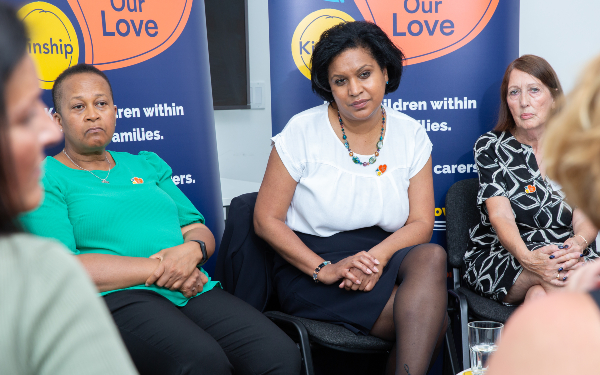
An expert on adultification bias against black children and young people has been appointed as the first national kinship care ambassador by the Department for Education (DfE).
Jahnine Davis’s role will involve supporting and challenging councils to improve practice, amplifying children’s voices and those of under-represented groups and championing kinship care within government policymaking.
Davis, who was in a kinship care arrangement as a child, has over 20 years’ experience in children’s services, academia, training and consultancy, with a particular focus on the safeguarding of black children and young people, in which she has a PhD.
Adultification bias
She is renowned for her work on adultification bias: the idea that black children, in particular, are seen as more adult and less vulnerable than other children, due to racist stereotyping.
Davis is also a member of the Child Safeguarding Review Panel, which oversees learning from serious cases of child harm, and has been the independent chair of various local child safeguarding practice reviews.
The ambassador role was announced in the previous government’s national kinship care strategy, published last year. This said the postholder would “support individual local authorities to refine their services to improve the outcomes and experiences of kinship carers” and “bring the voice of kinship carers into national policymaking”.
Announcing Davis’s appointment, children’s minister Janet Daby said: “Having experience of kinship care herself, her number one priority will be to advocate for children and carers to make sure that kinship care is properly recognised across government and local social services.”
‘My priorities will reflect the needs of kinship families’
Davis himself said: “I am honoured to be appointed as the first national kinship care ambassador in this country. My mission is to ensure that the experiences of carers and children remain a central focus across local authorities and government.
“In my role, I will work across government departments to facilitate learning, bring scrutiny, and challenge, and collaborate with ministers to highlight the experiences of kinship care in relevant areas. Over the next year, I will collaborate with local authorities to ensure that kinship children and carers receive the support they need and are aware of the resources available to them through local offers.
“My priorities will reflect the needs of kinship families, and I will work with the Department for Education and other departments to provide the best possible support, enabling children to thrive and carers to continue their invaluable care. As someone who was in a kinship arrangement as child, I know first-hand the warmth kinship care provides.”
Appointment welcomed by charities
Her appointment was strongly welcomed by the Family Rights Group (FRG) and fellow charity Kinship, which said Davis brought “a wealth of professional and lived experience to the role”.
FRG chief executive Cathy Ashley said the charity looked forward to working with Davis, saying it was “confident she will be the experienced, determined champion kinship children and carers need”.
“Moreover, her research specialism in safeguarding Black children will bring important understanding and insight to tackle the racial disparities which pervade kinship care,” she added.
Local offer for kinship families pledged
In an article for the Mirror setting out the Labour government’s stall on kinship care, Daby also pledged new guidance for councils designed to make sure “every authority sets out the support it will provide locally to kinship carers”.

DfE minister Janet Daby meeting a group of kinship carers (photo supplied by Kinship)
“We’re planning for it to emphasise what is already clear from case law: that a child’s best interest should always be at the forefront of council’s decision-making when it comes to whether a child should be placed with extended family or moved into foster care or a care home.”
The FRG, which has campaigned for such a local offer, hailed the move as an opportunity to tackle a lack of state support for kinship carers and children.
However, it called for the government to go further by enshrining the local offer in legislation, alongside adequate investment, “to enable all children to thrive”.
Ongoing financial hardship for carers
The news came as Kinship released its annual survey of carers, which found they were continuing to struggle with financial hardship, a theme of last year’s report.
For example, kinship carers (17%) were more than four times as likely as all adults (4%, based on Office for National Statistics data) to have had a bill they weren’t able to pay in the past month.
With the exception of family and friends foster carers – who represented 16% of the charity’s more than 1,300 respondents – kinship carers are not entitled to financial support from local authorities.
A recent report from Kinship found that children were staying longer in the care system because of inequalities in payments to kinship carers.
Call to tackle ‘unjust’ level of support for kinship carers
Welcoming the government’s focus on the group, Kinship chief executive Lucy Peake said: “This is a pivotal moment for the new government to show its commitment to children in poverty by tackling the existing, unjust system and ensuring every kinship carer is given what they need to raise the children in their care.
“The government must urgently share an ambitious and comprehensive vision for a new kinship care system, fit for the future, that includes financial allowances for all kinship families, on a par with foster carer payments, and a new, statutory right to paid kinship care leave from the workplace when they take on the care of a child.”
In its kinship care strategy, the previous Conservative government announced it would pilot providing special guardians of former looked-after children with allowances equivalent to those received by foster carers, in eight areas from 2024-28, backed by £16m in 2024-25.
No further announcement was made before the July 2024 election, and the Labour administration is yet to comment on whether it is taking forward the so-called financial allowances pathfinder.
It is likely that this will be confirmed at the Budget on 30 October 2024.





 Bournemouth, Christchurch and Poole
Bournemouth, Christchurch and Poole  Hampshire County Council
Hampshire County Council  Lincolnshire County Council
Lincolnshire County Council  Norfolk County Council
Norfolk County Council  Northamptonshire Children’s Trust
Northamptonshire Children’s Trust  South Gloucestershire Council
South Gloucestershire Council  Wiltshire Council
Wiltshire Council  Wokingham Borough Council
Wokingham Borough Council  Children and young people with SEND are ‘valued and prioritised’ in Wiltshire, find inspectors
Children and young people with SEND are ‘valued and prioritised’ in Wiltshire, find inspectors  How specialist refugee teams benefit young people and social workers
How specialist refugee teams benefit young people and social workers  Podcast: returning to social work after becoming a first-time parent
Podcast: returning to social work after becoming a first-time parent  Podcast: would you work for an inadequate-rated service?
Podcast: would you work for an inadequate-rated service?  Family help: one local authority’s experience of the model
Family help: one local authority’s experience of the model  Workforce Insights – showcasing a selection of the sector’s top recruiters
Workforce Insights – showcasing a selection of the sector’s top recruiters 

 Facebook
Facebook X
X LinkedIn
LinkedIn Instagram
Instagram
Comments are closed.